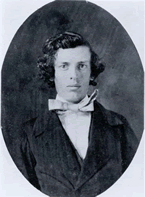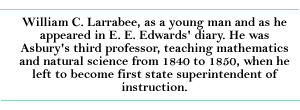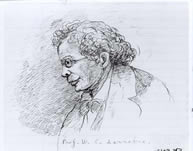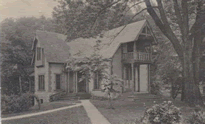|

<< Back
The
third professor appointed to Indiana Asbury University was William
C. Larrabee, who took over the chair in mathematics in 1841 and
also became responsible for teaching the natural sciences. Born
in Maine in 1802, he was nine years older than President Simpson
and had attended Bowdoin College with Franklin Pierce, who later
became president of the United States. His professional experience
included teaching posts at Connecticut Wesleyan University and Oneida
College Seminary in the state of New York, as well as taking part
in the first geological survey of Maine. Historian George Manhart
called Larrabee the "most versatile man ever associated with
Asbury or DePauw" With his wife, who founded the Greencastle
Female Collegiate Seminary, he built a Gothic Revival home near
the present site of Bishop Roberts Hall. They named it Rosabower
after their beloved daughter Rosa, who died young and was buried
in the Dells. In a collection of essays entitled Rosabower published
in 1852, Larrabee described the scene in mid-19th century romantic
prose:
 
There are voices here, gentle reader: the voices of Nature in her
gladness and love. Lots of merry crickets are chirping in the tall
grass. The incessant hum of the bee is heard in the air and on the
trees overhead. On a little bush by my side sits the sparrow singing
to its mate on her nest in the neighboring thicket. From the fence
corner comes the plaintive monotone of the robin. From the crevice
in the old stump flits the wren twittering emulous. On the topmost
branch of the maple sits the mocking-bird, most tuneful of nature's
warblers, leaving, in her ecstacies of melody, nothing unimitated.
From the adjacent grove comes the cooing of the turtle-dove, mournful
and sad. Even the pines, in their waving tassels, furnish a harp
for the winds, giving out music soft, soothing, and inimitable....
 
One evening, in the merry month of May, she was rambling with me
about this shady glen, and about the garden walks of home, till
the fading twilight sent us to repose. To the night succeeded a
morning of intense anxiety. There was hurrying to and fro about
the house, and flitting forms of physicians and friends passed and
repassed by me, as I was watching intent over my sick and dying
child. Another night-a night of bitter agony, a night of intense
anguish, a night of dying hope, a night of despair-passed slow and
sad away. Another morning came-the morning of the holy Sabbath came
bright and beautiful; but I can only remember the voice of wailing
and of woe in my once happy home, the melancholy tones of the bell
of death pealing on the air, the long funeral procession, the open
grave, and by the side of it a coffin with its lid upraised, and
in that coffin my own little Emma Rosabelle, with the sunlight of
heaven beaming bright on her cold, pale, yet beautiful face. We
buried her-buried her here in this rural spot. `When I am dead'
said she, a few days before she fell sick, `they will not bury me
in the cold graveyard, but they will bury me in the bower among
the flowers, and my father and my mother will come and sit by me.'
So we buried her here, in this lovely bower, and for her sake we
call it Rosabower.

After
10 years on the faculty Larrabee left Asbury to become Indiana's
first superintendent of public instruction. The university eventually
purchased Rosabower, which survived until the 1930s, serving variously
as a dormitory, an infirmary, and for other uses.
Back
to Top
<<
Back
|







